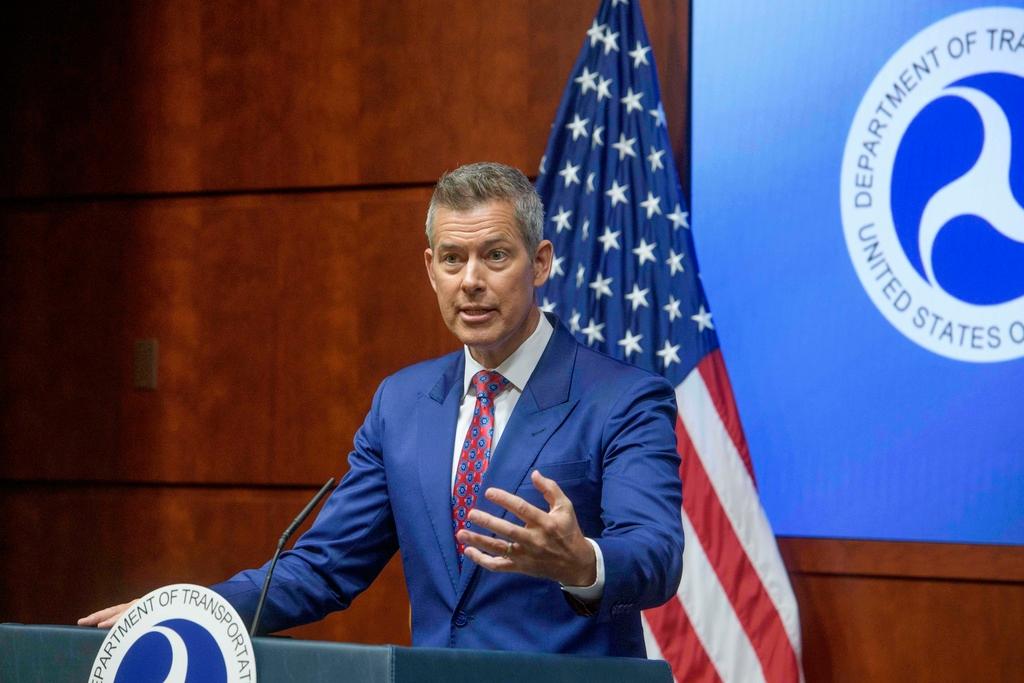
By Michael Casey and Rebecca Boone | AP
A federal judge on Thursday blocked the Trump administration from withholding billions of dollars in transportation funds from states that don’t agree to participate in some immigration enforcement actions.
Twenty states sued after they said Transportation Secretary Sean Duffy threatened to cut off funding to states that refused to comply with President Donald Trump’s immigration agenda. U.S. District Judge John McConnell Jr. barred federal transportation officials from carrying out that threat before the lawsuit is fully resolved.
“The Court finds that the States have demonstrated they will face irreparable and continuing harm if forced to agree to Defendants’ unlawful and unconstitutional immigration conditions imposed in order to receive federal transportation grant funds,” wrote McConnell, the chief judge for the federal district of Rhode island. “The States face losing billions of dollars in federal funding, are being put in a position of relinquishing their sovereign right to decide how to use their own police officers, are at risk of losing the trust built between local law enforcement and immigrant communities, and will have to scale back, reconsider, or cancel ongoing transportation projects.”
On April 24, states received letters from the Department of Transportation stating that they must cooperate on immigration efforts or risk losing the congressionally appropriated funds. No funding was immediately withheld, but some of the states feared the move was imminent.
Attorneys general from California, Colorado, Connecticut, Delaware, Hawaii, Illinois, Maine, Maryland, Massachusetts, Michigan, Minnesota, Nevada, New Jersey, New Mexico, New York, Oregon, Rhode Island, Washington, Wisconsin and Vermont filed the lawsuit in May, saying the new so-called “Duffy Directive” put them in an impossible position.
“The States can either attempt to comply with an unlawful and unconstitutional condition that would surrender their sovereign control over their own law enforcement officers and reduce immigrants’ willingness to report crimes and participate in public health programs — or they can forfeit tens of billions of dollars of funds they rely on regularly to support the roads, highways, railways, airways, ferries, and bridges that connect their communities and homes,” the attorneys general wrote in court documents.

Colorado has been called a “sanctuary state” by the Trump administration, a political term with no legal definition. The state restricts local and state law enforcement officers from enforcing civil immigration laws, and restricts federal immigration agents from operating in courthouses, but otherwise leaves it to the federal government to handle civil immigration cases.
That’s not enough for the Trump administration, which has demanded that state, county and city police make immigration arrests and hold people at taxpayer expense until agents from Immigration and Customs Enforcement are able to pick them up at their convenience. Immigration and border control are federal responsibilities.
Just this week, the Jefferson County Sheriff’s Office and the Colorado office of Immigration and Customs Enforcement found themselves in a rare public standoff among law enforcement agencies over ICE’s demands.
Jeffco had notified ICE that a county jail inmate ICE was interested in detaining was going to be released, but an ICE official told the office that they would not pick him up. So the man was released.
Later, ICE posted on social media that Jeffco had refused to hold the man for ICE.
“Let’s be clear: we are not legally allowed to directly turn over an inmate to any law enforcement agency without a judicially authorized warrant under Colorado law. That includes ICE,” the Jeffco agency said in its own social media post. “When we called the ICE Denver office about their misleading post, they made their position unmistakable: if we do not provide ICE extra time to coordinate inmate pickups from our facility, in violation of Colorado law, deceptive posts like yesterday’s will become the norm.
The JCSO respects and follows Colorado law. We will continue to follow the law and stand by the truth.”
Acting Rhode Island U.S. Attorney Sara Miron Bloom had argued to the judge that Congress has given the Department of Transportation the legal right to set conditions for the grant money it administers to states, and that requiring compliance and cooperation with federal law enforcement is a reasonable exercise of that discretion. Allowing the federal government to withhold the funds while the lawsuit moves forward doesn’t cause any lasting harm, Bloom wrote in court documents, because that money can always be disbursed later if needed.
But requiring the federal government to release the money to uncooperative states will likely make it impossible to recoup later, if the Department of Transportation wins the case, Bloom said.








